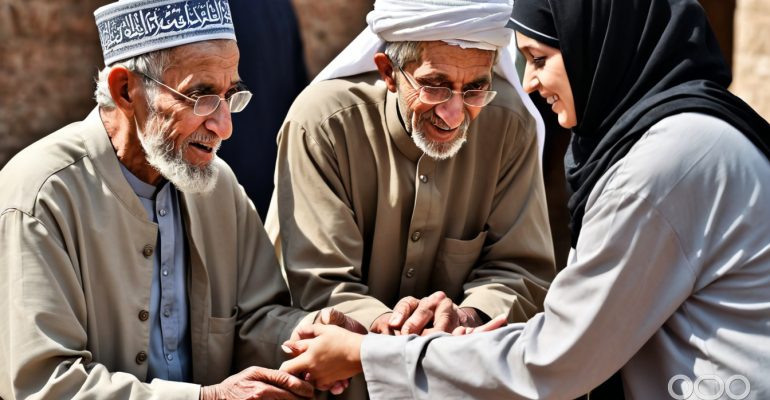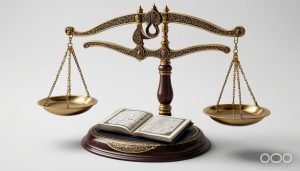Quran’s Focus on Dignity and Ethics
January 29, 2024 2025-08-13 11:18Quran’s Focus on Dignity and Ethics
Quran’s Focus on Dignity and Ethics
The Quran is the holy book of Islam, revealed by Allah to Prophet Muhammad (peace be upon him) over 23 years. The Quran is the source of guidance, wisdom, and knowledge for Muslims, and it covers various aspects of life, such as faith, worship, morality, law, and society. One of the main themes of the Quran is the focus on dignity and ethics, which are essential for human well-being and happiness. In this blog post, we will explore what the Quran says about dignity and ethics, and how Islam teaches the lesson of human respect and dignity. We will also discuss what are the Quranic work ethics, and how they can help us achieve success and excellence in our personal and professional lives.
What does the Quran say about dignity?
Dignity is the state of being worthy of honor and respect, and having a sense of self-esteem and self-worth. The Quran affirms that dignity is a gift from Allah to all human beings, regardless of their race, gender, nationality, or religion. Allah says in the Quran:
We have honored the children of Adam and carried them by land and sea; We have provided good sustenance for them and favored them specially above many of those We have created. (Quran, 17:70)
This verse shows that Allah has created human beings in the best of forms, and has given them a special status and rank among His creation. He has also provided them with the means and resources to live a dignified and comfortable life. Therefore, human dignity is not something that can be earned or acquired by human efforts, but rather it is a divine gift and a natural right that belongs to every human being.
However, human dignity is also a responsibility and a trust that requires human beings to uphold and protect it. The Quran warns that human dignity can be lost or violated by following the wrong path, such as disbelief, disobedience, injustice, oppression, corruption, and immorality. Allah says in the Quran:
But those who reject Our signs and treat them with arrogance, they are the Companions of the Fire, to dwell therein (forever). (Quran, 7:36)
And do not approach immoralities – what is apparent of them and what is concealed. And do not kill the soul which Allah has forbidden [to be killed] except by [legal] right. This has He instructed you that you may use reason. (Quran, 6:151)
These verses show that human dignity is not absolute or unconditional, but rather it is contingent on following the guidance and commands of Allah, and avoiding the prohibited and harmful actions. Human dignity is also linked to the dignity of Allah, as He is the Creator and the Master of human beings, and He deserves the utmost respect and reverence. Allah says in the Quran:
And whoever honors the symbols of Allah – indeed, it is from the piety of hearts. (Quran, 22:32)
The symbols of Allah refer to anything that represents or reminds of Allah, such as His names, His attributes, His signs, His messengers, His books, His house, and His rituals. Honoring the symbols of Allah means to respect and venerate them, and to follow and obey them. This is a sign of piety and righteousness, which enhances human dignity and honor.
What does the Quran say about ethics?
Ethics is the branch of knowledge that deals with moral principles and values, and how they guide human behavior and actions. The Quran is the ultimate source of ethics for Muslims, as it provides the moral framework and the ethical standards that govern all aspects of life. The Quran defines what is good and what is evil, what is right and what is wrong, what is lawful and what is unlawful, what is beneficial and what is harmful, and what is pleasing and what is displeasing to Allah. The Quran also gives examples and stories of the prophets, the righteous, the wicked, and the nations of the past, to illustrate the consequences and outcomes of ethical and unethical choices and actions.
The Quranic ethics are based on the belief in Allah, the Day of Judgment, and the accountability of human deeds. The Quran motivates human beings to do good and avoid evil, by promising rewards and punishments in this life and the hereafter. The Quran also appeals to human reason, conscience, and intuition, to recognize and appreciate the moral values and virtues that Allah has instilled in human nature. The Quran says:
By the soul and He who proportioned it. And inspired it [with discernment of] its wickedness and its righteousness. He has succeeded who purifies it, and he has failed who instills it [with corruption]. (Quran, 91:7-10)
This verse shows that Allah has created the human soul with a natural inclination towards good and evil, and has given it the ability to distinguish between them. Allah has also given human beings the free will and the choice to purify or corrupt their souls, by following or rejecting His guidance. The success or failure of human beings depends on their ethical choices and actions, which reflect the state of their souls.
The Quranic ethics are also based on the principle of justice, which is the foundation of Islam and the goal of Shariah (Islamic law). Justice means to give everyone their due rights, and to uphold the balance and harmony that Allah has established in the universe. Justice also means to stand up for the truth, and to oppose the oppression, injustice, and tyranny that violate the dignity and rights of human beings and other creatures. The Quran commands:
O you who have believed, be persistently standing firm in justice, witnesses for Allah, even if it be against yourselves or parents and relatives. Whether one is rich or poor, Allah is more worthy of both. So follow not [personal] inclination, lest you not be just. And if you distort [your testimony] or refuse [to give it], then indeed Allah is ever, with what you do, Acquainted. (Quran, 4:135)
This verse shows that justice is a sacred duty and a moral obligation for Muslims, and they should uphold it at all costs, even if it goes against their own interests or the interests of their loved ones. Justice is also independent of the social or economic status of the parties involved, as Allah is the only one who deserves the ultimate loyalty and obedience. Justice also requires honesty and integrity, and avoiding any bias or distortion that may affect the truth and fairness.
What does Islam teach the lesson of human respect and dignity?
Islam teaches the lesson of human respect and dignity in various ways, such as:
- Islam teaches that all human beings are equal in dignity and worth, and that there is no superiority or inferiority based on race, color, language, or ethnicity. The only criterion of distinction and honor is piety and righteousness, which are known only to Allah. The Prophet Muhammad (peace be upon him) said:
O people, your Lord is one and your father is one. You are all from Adam and Adam was from dust. There is no superiority for an Arab over a non-Arab, nor for a non-Arab over an Arab, nor for a white over a black, nor for a black over a white, except by piety. (Musnad Ahmad)
- Islam teaches that human beings are the vicegerents and trustees of Allah on earth, and that they have a noble mission and a great responsibility to worship Allah, to spread His message, and to establish His justice and mercy on earth. The Quran says:
And [mention, O Muhammad], when your Lord said to the angels, “Indeed, I will make upon the earth a successive authority.” They said, “Will You place upon it one who causes corruption therein and sheds blood, while we declare Your praise and sanctify You?” Allah said, “Indeed, I know that which you do not know.” (Quran, 2:30)
- Islam teaches that human beings are the best of creation, and that they have been endowed with many gifts and talents, such as intelligence, creativity, language, and free will. The Quran says:
He taught Adam the names – all of them. Then He showed them to the angels and said, “Inform Me of the names of these, if you are truthful.” They said, “Exalted are You; we have no knowledge except what You have taught us. Indeed, it is You who is the Knowing, the Wise.” He said, “O Adam, inform them of their names.” And when he had informed them of their names, He said, “Did I not tell you that I know the unseen [aspects] of the heavens and the earth? And I know what you reveal and what you have concealed.” (Quran, 2:31-33)
- Islam teaches that human beings are the family of Allah, and that they have a mutual bond of love, compassion, and mercy. The Prophet Muhammad (peace be upon him) said:
- Islam teaches that human beings have rights and duties towards each other, and that they should treat each other with kindness, generosity, and respect. The Quran says:
And serve Allah and do








